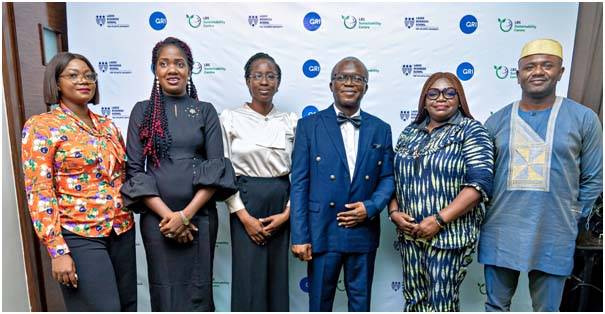GRI, LBSSC Launch GRI 13 Agric Sector Sustainability Reporting Standard

L-R: Nnena Jane Ogoke, National Sales Manager, AFEX Commodities; Orevaoghene Atanya, Head, Sustainability, Lagos Business School; Funmilayo Olawale, Chief Operating Officer, JR Farms; Prof Ikechukwu Kelikume, Faculty Director, AgriBusiness Programme, Lagos Business School; Dr Helen Emore, Co-Founder, Agroverified and Scientia Partners; Johnathan Ikeolumba, Affiliate Researcher, LBS Sustainability Centre.
The Africa regional hub of the Global Reporting Initiative (GRI) in partnership with the Lagos Business School Sustainability Centre (LBSSC) unveiled the GRI 13 Sector Standard designed to enhance the quality, consistency and comparability of reporting sustainability impacts for Agriculture, Aquaculture and Fishing sectors.
The event which took place on Thursday, November 30, 2023 at the George Hotel, Lagos, doubled as the Launch of the new reporting standard and a platform for stakeholder dialogue.
The sector-specific reporting standard which will come into effect on January 1, 2024, will spotlight businesses in the sector ways to enable sustainable agricultural practices that enhance fair trade, improve competitiveness and promote responsible business conduct..
In her welcome remarks, Oreva Atanya, Head, Sustainability, Lagos Business School, pointed out the importance of a globally aligned but locally useful and applicable guide for business with sustainability goals and objectives that will be beneficial to our food production systems and the related supply chains.
In his presentation of the GRI13, the Director, GRI Africa, Douglas Kativu who spoke on ‘Driving Responsibility and Accountability in Agriculture, Aquaculture, and Fishing’ maintained that the sector reporting standard is developed to provide information that apply to organisations involved in crop, animal and fisheries production, with 26 likely material topics for the sectors grouped under climate and environment, human rights and communities, equitable livelihoods, ethics and governance, food and health, employment and farming and fishing practices.
The topics align with many authoritative international instruments defining responsible business conduct as well as the Sustainable Development Goals (SDGs) 2030.

Cross-section of participants at the event
There is no doubt agriculture and food systems have an immense impact on the triple bottom line of people, planet and profits, hence, the need to curtail excesses of players in the sector by standardising the quality of systems, products and processes in the agriculture sector for better environmental stewardship, social equity and economic viability. It is the hope of GRI, LBS and the sector players that the new sector standard will reduce greenwashing and increase quality of sustainability reporting while enhancing the completeness and compatibility of sustainability information for all organisations in Nigeria involved in the sector.
A panel discussion on “Enhancing Competitiveness Through Responsibility, Traceability, and Shared Value”; proffered solutions to the various traceability and standardisation challenges plaguing the sector in Nigeria. The panel was made of expert speakers drawn from the academia and agro-allied industry namely: Dr Ikechukwu Kelikume, Academic Director, Agribusiness Management Programme (AGMP), Lagos Business School; Dr Helen Emore, Co-Founder, Agro-Verified, and Scientia Partners; Oluwafunmilayo Ajibike Olawale, Chief Operating Officer, JR Farms Africa; and Nnena Jane Ogoke, National Sales Manager, AFEX Commodities Exchange.
This sector-specific reporting standard which comes into effect on January 1, 2024, according to Jonathan Ikeolumba, Affiliate Researcher, Lagos Business School Sustainability Centre, who delivered the summary of learnings, will spotlight for businesses in the sector ways to enable sustainable agricultural practices that enhance fair trade, improve competitiveness and promote responsible business conduct.
Lagos Business School Sustainability Centre is a partner of Global Reporting Initiative (GRI) Africa.
GRI is a global standardisation organisation which has developed and delivered the global best practice for how organisations communicate and demonstrate accountability for their impacts on the environment, economy and people. GRI provides the world’s widely used sustainability reporting standards which cover a wide range of topics from biodiversity to agriculture to health and safety and everything in between.





